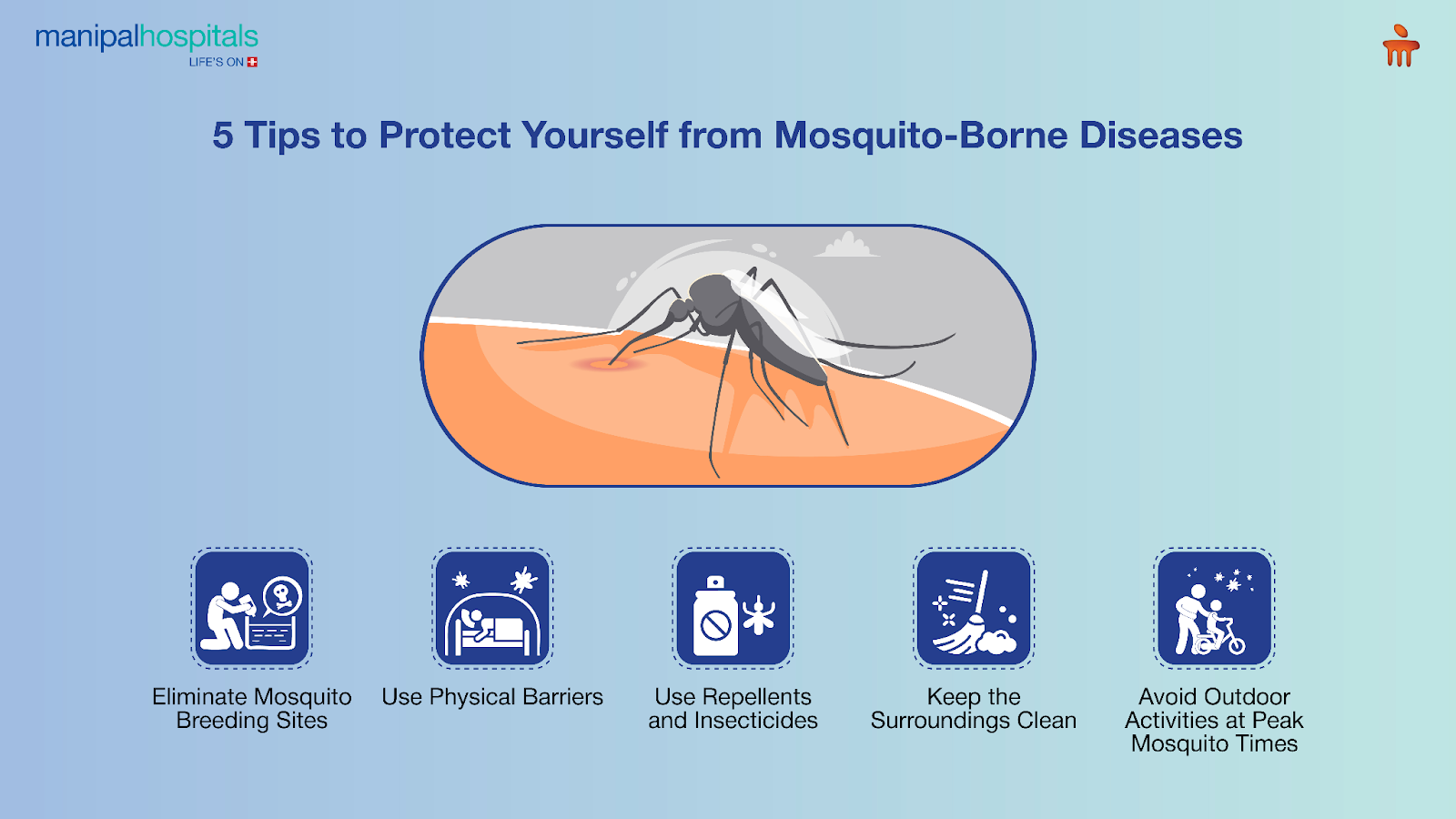
The monsoon season in Gurgaon, while a welcome respite from the scorching summer heat, brings with it an increased risk of mosquito-borne illnesses. With water stagnation in drains, pots, and puddles, the city becomes a breeding ground for disease-causing mosquitoes. Every year, Gurgaon witnesses a spike in cases of dengue, chikungunya, malaria, and viral fevers during and after the rainy season.
To stay safe and healthy, it's essential to take proactive measures to prevent mosquito bites and boost immunity. This comprehensive guide provides practical strategies, health tips, and dietary advice to help you protect yourself and your family during the monsoon.
Synopsis
Common Mosquito-Borne Diseases in Gurgaon During Monsoon
-
Dengue
-
Caused by: Aedes aegypti mosquito (bites during the day)
-
Symptoms: High fever, severe headache, joint/muscle pain, rash, and in severe cases, bleeding.
-
-
Chikungunya
-
Caused by: Aedes mosquito (daytime biter)
-
Symptoms: Fever, joint pain, rash, and fatigue.
-
-
Malaria
-
Caused by: Anopheles mosquito (bites at night)
-
Symptoms: Cyclical fever with chills, body aches, vomiting, and fatigue.
-
-
Japanese Encephalitis & Viral Fevers
-
Though less common in urban areas, isolated cases may occur in peri-urban areas and on the outskirts.
-
How to Protect Yourself from Mosquito-Borne Diseases

1. Eliminate Mosquito Breeding Sites
-
Empty and clean water containers every alternate day (coolers, plant trays, buckets).
-
Ensure no water stagnation on rooftops, balconies, or in potholes.
-
Cover overhead tanks and underground water storage.
-
Clear clogged drains around your home or society.
2. Use Physical Barriers
-
Install fine mesh screens on windows and doors.
-
Use mosquito nets, especially at night.
-
Wear full-sleeved clothes and trousers, especially during early morning and dusk.
3. Use Repellents and Insecticides
-
Apply mosquito repellent creams (like Odomos) when stepping out.
-
Use indoor sprays or plug-in vaporisers.
-
Use mosquito coils or herbal fumigation (neem, camphor) in the evenings.
4. Keep the Surroundings Clean
-
Avoid garbage accumulation near your house.
-
Trim bushes and prevent overgrown vegetation where mosquitoes can hide.
-
Coordinate with local municipal bodies for fumigation drives.
5. Avoid Outdoor Activities at Peak Mosquito Times
- Try to avoid early morning walks or outdoor activities after sunset when mosquito activity is high.
Boosting Immunity During Monsoon: Diet Tips for Mosquito Protection
A strong immune system can help prevent infections or lessen the severity of mosquito-borne diseases. Dietary Tips to Follow During Gurgaon’s Monsoon
1. Eat Immunity-Boosting Foods
-
Citrus fruits (lemons, oranges, amla): Rich in Vitamin C to fight infection
-
Papaya leaves (for dengue patients): Traditionally known to help increase platelet count
-
Garlic & turmeric: Natural anti-inflammatory and antibacterial properties
-
Ginger & tulsi tea: Fights inflammation and strengthens respiratory immunity
-
Green leafy vegetables (well-cooked): Provide iron, folate, and vitamin A
2. Include High-Protein Foods
Proteins help repair tissues and build immune cells:
-
Eggs, paneer, dal, chicken (well-cooked), tofu
-
Avoid raw or undercooked meats during the monsoon
3. Use Natural Detoxifiers
-
Neem juice (in small amounts): Known for purifying blood and fighting infections
-
Aloe vera juice: Aids digestion and detoxification
4. Drink Safe and Clean Water
-
Always boil or purify water before drinking
-
Avoid roadside juices, golgappas, and uncooked salads from vendors
5. Stay Hydrated
-
Drink 8–10 glasses of water daily
-
Include ORS, coconut water, or homemade electrolyte drinks if fever strikes
What to Avoid During Monsoon
-
Street food: High risk of contamination during this season
-
Raw salads from restaurants can harbour bacteria and viruses
-
Cold drinks/ice from unknown sources
-
Overconsumption of spicy and oily food can weaken immunity and digestion
Tips to Prevent Mosquito-Borne Diseases
-
Get timely vaccinations for flu and typhoid as advised
-
Seek early medical attention if you experience a high fever, rash, or joint pain
-
Monitor platelet counts in case of suspected dengue
-
Use mosquito patches for kids and babies
-
Ensure pets are also protected (mosquitoes can bite animals, too)
When to See an Infectious Disease Doctor in Gurgaon
Consult an internal medicine specialist in Gurgaon immediately if you have:
-
Fever lasting more than 2 days
-
Bleeding gums, nosebleeds, or bruises
-
Sudden drop in platelet count
-
Dehydration or inability to eat
The Gurgaon monsoon brings its own charm but also a serious health threat if precautions aren’t taken. Mosquito-borne diseases can be prevented entirely with proper hygiene, regular checks for stagnant water, use of repellents, and a strong immune system. By combining lifestyle precautions with a nutritious, immunity-rich diet, you can enjoy the monsoon safely and stay protected against infections. Visit the Internal Medicine department at Manipal Hospital for a consultation with our highly experienced and reputed infectious disease doctors in Gurgaon for comprehensive and optimum care.
FAQ's
Use mosquito repellents, wear full-sleeved clothing, install nets/screens, and avoid outdoor activity during peak mosquito hours (dawn and dusk). Also, eliminate standing water around your home.
-
Dengue: High fever, body aches, rash, bleeding
-
Malaria: Fever with chills, fatigue, sweating
-
Chikungunya: Fever, severe joint pain, rash
While both are spread by Aedes mosquitoes and share similar symptoms, dengue often causes bleeding and low platelet count, whereas chikungunya mainly causes prolonged joint pain.
Yes. Indoor containers like flower vases, AC trays, coolers, and uncovered tanks can hold stagnant water where mosquitoes lay eggs. Clean or empty them regularly.
No. Diseases like dengue, malaria, and chikungunya are not spread from person to person. They are transmitted only through the bite of an infected mosquito.





















 5 Min Read
5 Min Read










.png)









